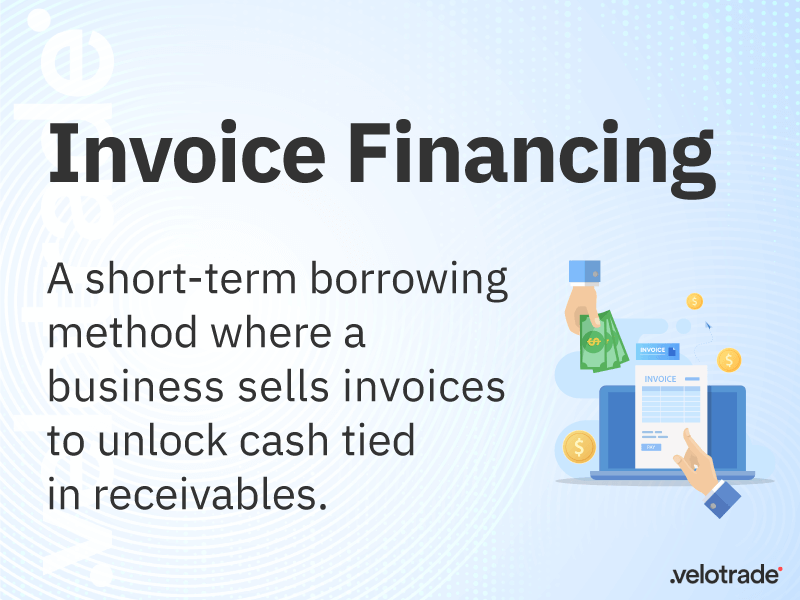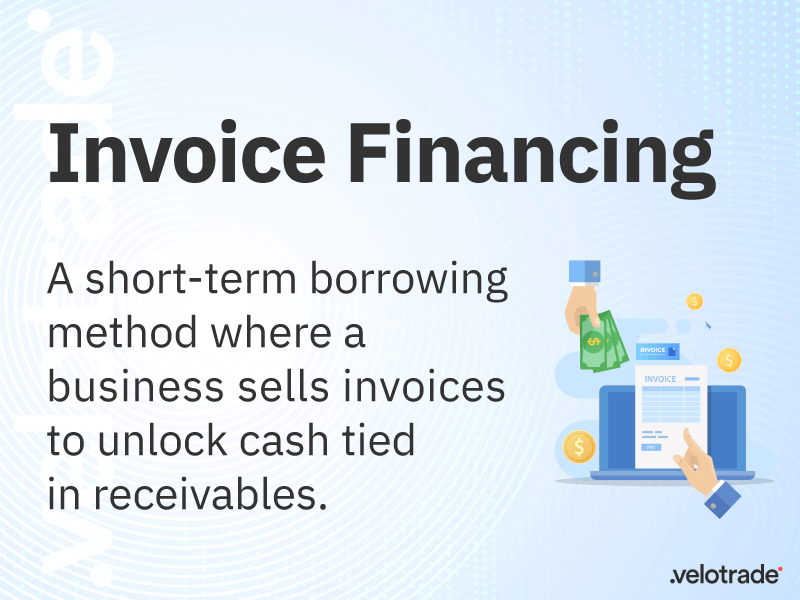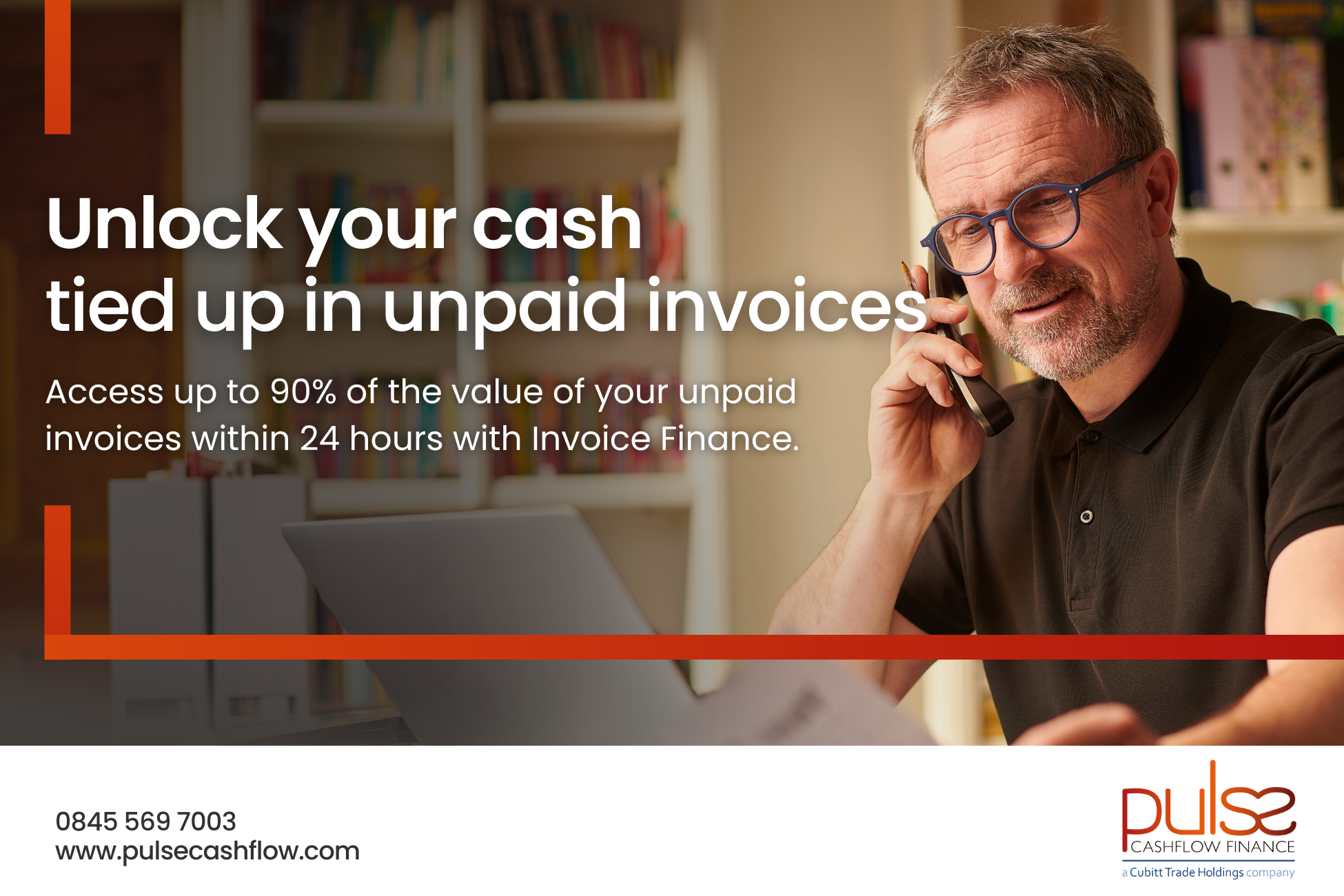Invoice finance facilities are financial services that allow businesses to access immediate funds by selling their unpaid invoices to a finance company for a fee. This enables businesses to maintain a steady cash flow and avoid waiting for clients or customers to settle their bills.
Invoice finance is a valuable financial solution for businesses that need immediate access to funds. It involves selling unpaid invoices to a finance company in exchange for a fee. This allows businesses to receive a significant portion of the outstanding invoice amount upfront, helping them maintain a steady cash flow and meet their financial obligations without delay.
Invoice finance facilities provide a convenient alternative to traditional bank loans, as they do not require collateral and are based on the value of the invoices. We will explore how invoice finance works, its benefits, and why businesses choose this financing option.

Credit: www.velotrade.com
What Is Invoice Finance Facility?
Invoice Finance Facility is a financial service that allows businesses to access immediate funds from their outstanding invoices. It helps improve cash flow by eliminating the wait for payment from clients or customers. This facility is offered by invoice finance companies and provides a convenient solution for managing working capital.
Definition Of Invoice Finance Facility
An invoice finance facility is a type of financing that allows businesses to receive immediate payment for their outstanding invoices. It is a flexible funding solution that enables companies to access the cash tied up in their unpaid invoices without having to wait for their customers to pay.
How Invoice Finance Facility Works
Invoice finance facilities work by leveraging the value of a company’s outstanding invoices. Instead of waiting for customers to pay, businesses can sell these invoices to a finance provider, also known as a factor, at a discount. The factor then advances a percentage of the invoice value, typically around 80-90%, to the business. Once the invoice is paid by the customer, the factor deducts their fee and reimburses the remaining balance to the business.
This type of financing is particularly beneficial for businesses that face long payment terms or rely on cash flow to fund their operations. It provides immediate access to working capital, which can be used to cover operational costs, pay suppliers, invest in growth opportunities, and more.
There are two common types of invoice finance facilities:
- Invoice Factoring: In invoice factoring, the factor takes full control of the sales ledger, credit control, and collection of payments. This means that the factor manages the entire process of collecting payments from customers on behalf of the business.
- Invoice Discounting: In invoice discounting, the business retains control over its sales ledger and is responsible for collecting payments from customers. The factor provides the funding and the business remains in charge of credit control.
Overall, an invoice finance facility is a valuable tool for businesses to improve cash flow, enhance working capital management, and unlock the potential of their outstanding invoices.

Credit: www.velotrade.com
Benefits Of Unlocking Cash Flow
Unlocking cash flow through an invoice finance facility offers numerous benefits, such as improved working capital, enhanced cash flow management, and increased financial stability for businesses. By leveraging unpaid invoices, businesses can obtain immediate funds to meet their operational needs and drive growth.
Increase In Working Capital
One of the primary benefits of unlocking cash flow through an Invoice Finance Facility is the increase in working capital. Businesses often find themselves in a situation where they have completed work or delivered goods to their clients but have to wait for weeks or even months to receive payment. This delay in receiving payment can severely impact operations and limit the company’s ability to take advantage of new opportunities or invest in growth.
By unlocking the cash tied up in outstanding invoices, businesses can bolster their working capital. This influx of cash allows them to cover immediate expenses, pay suppliers on time, and take advantage of growth opportunities. With a healthy working capital, businesses can operate more efficiently and seize opportunities that arise, ultimately boosting profitability.
Improves Cash Flow Management
Another significant benefit of unlocking cash flow through Invoice Finance is the improvement in cash flow management. Managing cash flow is crucial for any business, regardless of its size or industry. When cash flow is unbalanced, businesses may struggle to meet their financial obligations, leading to missed payments, strained relationships with suppliers, and even the inability to deliver goods or services to customers.
Invoice Finance helps businesses mitigate these cash flow challenges by providing a steady stream of cash through the immediate advance of funds against outstanding invoices. This predictable cash inflow allows businesses to manage their expenses, pay suppliers on time, and maintain a stable cash flow cycle. With improved cash flow management, businesses can avoid late payment fees, take advantage of early payment discounts, and build trust and credibility with their suppliers and clients.
Opportunity For Business Growth
Unlocking cash flow through an Invoice Finance Facility also presents a significant opportunity for business growth. With access to immediate funds, businesses can fund various growth initiatives that may have otherwise been delayed or even impossible to pursue.
Whether it’s expanding operations, investing in new equipment, hiring additional staff, or launching marketing campaigns, having the necessary cash flow can be a game-changer for businesses. By unlocking the cash tied up in outstanding invoices, businesses can seize growth opportunities when they arise, stay ahead of their competitors, and propel the company to new heights.
Types Of Invoice Finance Facilities
Invoice finance facilities refer to different types of financial services that allow businesses to access funds tied up in their outstanding invoices. These facilities provide a way for companies to receive immediate cash flow without having to wait for their clients or customers to settle their bills.
Examples of invoice finance facilities include invoice discounting and invoice factoring.
Factoring
Factoring is a type of invoice finance facility that allows businesses to sell their accounts receivable to a third-party financial institution, known as a factor. The factor then advances a percentage of the total invoice value to the business upfront, typically 70-90%. The remaining balance, minus a factoring fee, is paid to the business once the customer pays the invoice in full. Factoring is a popular choice for businesses that need immediate cash flow and prefer to offload the responsibility of collecting payments from customers. This type of invoice finance facility provides businesses with quick access to working capital, allowing them to cover operational costs, invest in growth opportunities, or manage other financial obligations. Some key features of factoring include: – Quick access to cash: Factoring provides businesses with immediate funds, enabling them to meet their financial needs without waiting for customer payments. – Outsourced credit control: Factors often handle the collection of payments from customers, freeing up the business’s time and resources to focus on core operations. – Non-recourse: In some cases, factoring can be non-recourse, which means the factor assumes the credit risk if the customer fails to pay the invoice. This can provide businesses with added protection against bad debts. – Confidentiality: Factoring can be done on a confidential basis, meaning the business’s customers may not be aware of the financial arrangement between the business and the factor.Invoice Discounting
Invoice discounting is another type of invoice finance facility that allows businesses to borrow money against their outstanding invoices. Unlike factoring, invoice discounting does not involve the sale of invoices to a third party. Instead, the business retains control over the collection process and maintains a direct relationship with its customers. With invoice discounting, the business can borrow a percentage of the invoice value from a finance provider, usually between 70-85%. The business then repays the borrowed amount, plus interest and fees, once the customer pays the invoice. Here are some key features of invoice discounting: – Control over credit management: Unlike factoring, invoice discounting allows businesses to retain control over credit management and collections, maintaining a direct relationship with their customers. – Confidentiality: Similar to factoring, invoice discounting can also be done on a confidential basis, so customers are unaware of the financial arrangement. – Flexibility: Invoice discounting provides businesses with flexibility as they can choose which invoices to utilize for financing, based on their immediate cash flow needs. – Suitable for established businesses: Invoice discounting is often preferred by established businesses with robust credit control processes and a history of reliable customer payments. In summary, both factoring and invoice discounting are valuable invoice finance facilities that can help businesses improve cash flow and manage their working capital more effectively. Choosing the right option depends on the specific needs and preferences of the business, including factors such as credit control, customer relationships, and confidentiality requirements.
Credit: uk.linkedin.com
How To Qualify For An Invoice Finance Facility
Obtaining an invoice finance facility can be a valuable means for businesses to improve cash flow and access working capital. However, to qualify for this financial solution, businesses need to meet specific criteria that demonstrate their creditworthiness, business operations and history, as well as the invoice value and customer base. Let’s explore each of these qualifying factors in detail.
Creditworthiness
When applying for an invoice finance facility, creditors often assess the creditworthiness of the business. They evaluate the credit score, financial statements, and payment history to determine the likelihood of timely repayment. To qualify, a business must maintain a favorable credit rating and exhibit the ability to manage its financial obligations responsibly.
Business Operations And History
Lenders also consider the longevity and stability of a business. They may review the operational history, industry experience, and overall business stability. A well-established and reputable business with a consistent track record is more likely to qualify for an invoice finance facility.
Invoice Value And Customer Base
Invoicing financing companies scrutinize the value and volume of invoices generated, as well as the diversity and financial strength of the customer base. The invoices should be free from any disputes and represent bona fide transactions. A broad customer base demonstrates a healthy sales pipeline and reduces risk for the finance provider.
Choosing The Right Invoice Finance Provider
In today’s competitive business landscape, choosing the right invoice finance provider is crucial for maintaining a healthy cash flow and ensuring business growth.
Assessing Provider’s Experience And Expertise
When selecting an invoice financing partner, it’s essential to assess the provider’s experience and expertise in the industry. Look for established firms with a proven track record of helping businesses in your specific sector. The provider should have a deep understanding of the invoice finance process and be able to offer tailored solutions to meet your company’s unique needs.
Considering Fees And Charges
Before committing to an invoice finance facility, carefully consider the fees and charges involved. Request a transparent breakdown of all costs, including any service fees, discount charges, and interest rates. Compare these figures with other providers to ensure you’re getting a competitive deal that aligns with your budget.
Understanding Contract Terms
When finalizing an agreement with an invoice finance provider, take the time to thoroughly understand the contract terms. Ensure that all terms and conditions are clearly outlined, and that there are no hidden clauses that could impact your business negatively. Seek legal advice if necessary to ensure full comprehension of the contract.
Frequently Asked Questions On Invoice Finance Facility
What Is An Invoice Financing Facility?
An invoice financing facility is a financial service that allows businesses to access immediate funds by selling their unpaid invoices to a finance company for a fee. It helps businesses improve cash flow by avoiding the wait for clients to settle their bills.
What Does Invoice Mean In Finance?
Invoice in finance refers to a time-stamped commercial document detailing a transaction between a buyer and a seller. It specifies credit terms and payment methods for goods or services bought.
What Is Invoice Financing Example?
Invoice financing allows businesses to receive immediate funds by selling their unpaid invoices to a finance company. For example, a construction contractor sells its outstanding invoices to a finance company to access cash flow.
How Do Invoice Finance Companies Make Money?
Invoice finance companies make money by offering a financial service that allows businesses to access immediate funds from their outstanding invoices. Instead of waiting for clients to pay, businesses can sell their unpaid invoices to the finance company for a fee.
Conclusion
Invoice financing is a valuable financial solution that provides businesses with immediate access to funds tied up in their outstanding invoices. By selling unpaid invoices to an invoice finance company, businesses can avoid the wait for clients or customers to settle their bills.
This enables businesses to maintain cash flow and meet important financial obligations. With its flexibility and accessibility, invoice finance is a game-changer for businesses looking to optimize their cash flow management. Explore the benefits of invoice finance and see how it can transform your business today.